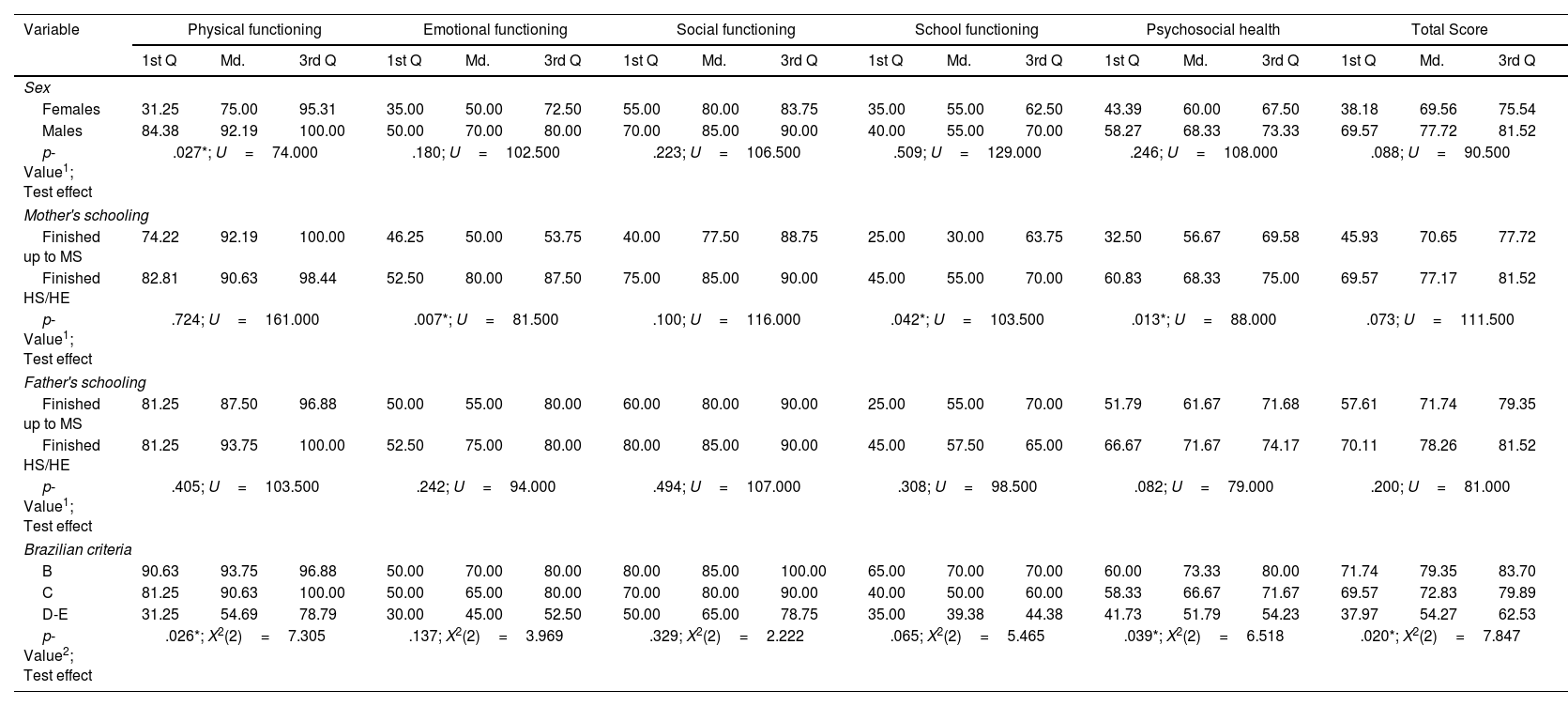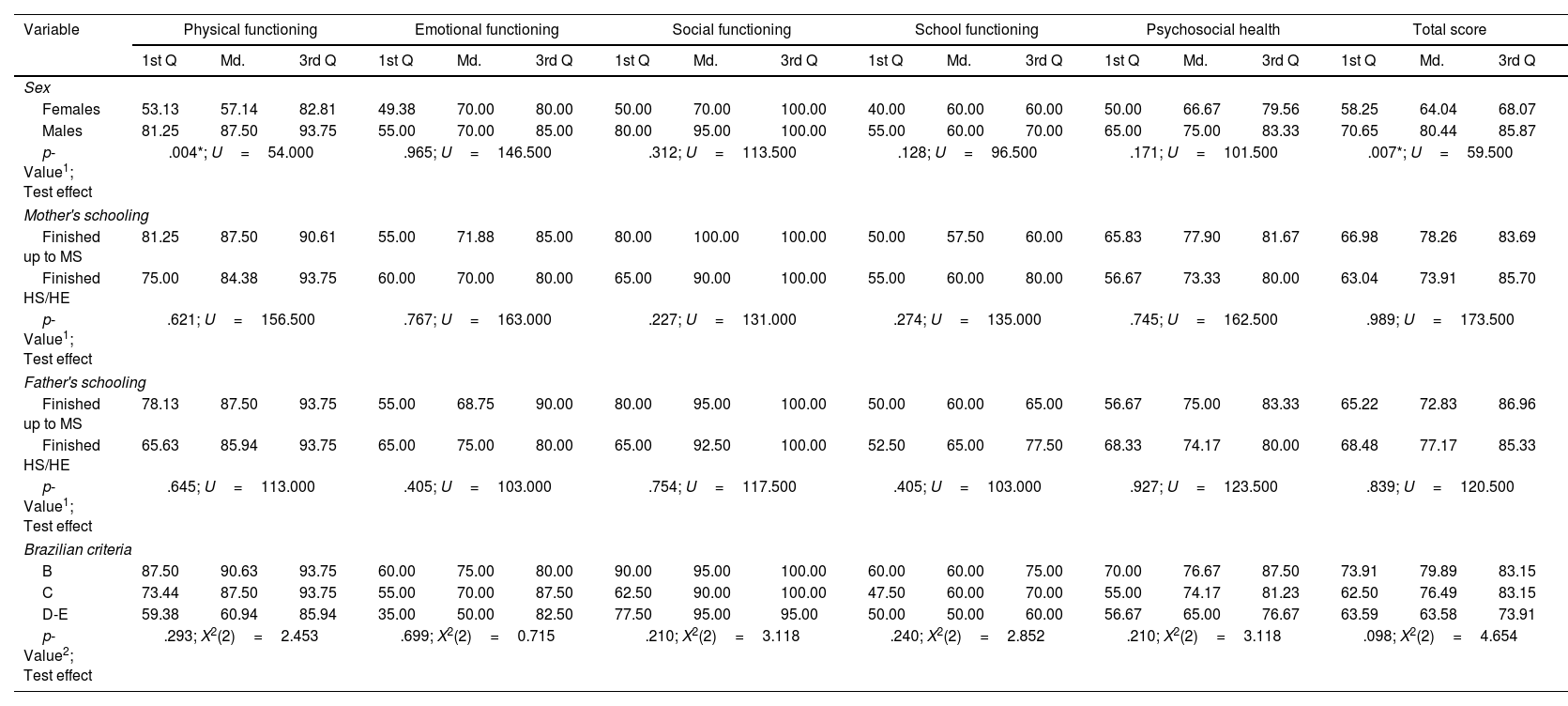To investigate the association between the quality of life, activity limitations, and participation restrictions in children that attended a speech-language-hearing assessment and diagnostic service.
MethodThis is an observational, analytical, cross-sectional study with children and adolescents 8–12 years old who had been submitted to the speech-language-hearing assessment process, and with their parents/guardians. The Brazilian Economic Classification Criteria (Brazilian Criteria), the Pediatric Quality of Life Inventory 4.0 (PedsQL), and the International Classification of Functioning, Disability and Health (ICF) were employed; secondary data were collected as well. The data were analyzed with the distribution of frequency, measures of central tendency and dispersion, and the Shapiro–Wilk, Mann–Whitney, and Kruskal–Wallis tests.
ResultsOf the 45 participants, 37 were males and 8 were females, mean age of 10.23 years (SD=1.47 and median=10.16). There was a statistical difference between child and parent PedsQL domains and sex, economic classification, and parental schooling. The correlation between their age and the PedsQL domains had a weak correlation with the Social domain. A statistically significant difference was verified between the parent PedsQL domains and the ICF categories referring to Self-care, Particular interpersonal relationships, and Education. The child PedsQL domains had statistically significant differences with categories referring to Receiving, Producing, and General interpersonal interactions.
ConclusionIn this study, the quality of life was associated with sociodemographic aspects and the ICF Activities and Participation component in children with speech-language-hearing complaints.
Investigar la asociación entre la calidad de vida, la limitación de actividades y la restricción de la participación en niños que utilizan un servicio de evaluación y diagnóstico en Fonoaudiología.
MétodoSe trata de un estudio observacional analítico transversal realizado con niños y adolescentes de ocho a 12 años que pasaron por un proceso de evaluación fonoaudiológica, así como sus responsables. Se utilizó el Criterio de Clasificación Económica Brasileño (CCEB), el Pediatric Quality of Life Inventory 4.0 (PedsQL), la Clasificación Internacional del Funcionamiento de la Discapacidad y de la Salud (CIF) y se recogieron datos secundarios. El análisis de los datos se realizó mediante distribución de frecuencias, medidas de tendencia central y dispersión y pruebas de Shapiro-Wilk, Mann-Whitney y Kruskal-Wallis.
ResultadosDe los 45 participantes, 37 eran del género masculino y ocho del femenino, con una edad media de 10,23 años (SD = 1,47 y mediana = 10,16). Hubo una diferencia estadísticamente significativa entre los dominios PedsQL de padres e hijos con el género, la clasificación económica y la educación de los padres. La correlación entre la edad y los dominios del PedsQL reveló una débil correlación con el dominio social. Se encontró una diferencia con significación estadística entre los dominios PedsQL de los padres y las categorías de la CIF relacionadas con el cuidado personal, las interacciones interpersonales particulares y la educación. Por otro lado, los dominios del PedsQL de los niños mostraron diferencia con significación estadística con categorías relacionadas con la recepción, la producción y las Interacciones interpersonales generales.
ConclusiónEl estudio reveló que la calidad de vida estaba asociada a los aspectos sociodemográficos y al componente actividades y participación de la CIF en niños con motivos de consulta fonoaudiológicos.











